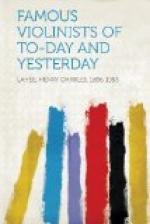In 1892 Marteau carried off the first prize for violin playing at the Paris Conservatoire, and Massenet, the celebrated French composer, wrote a concerto for him.
When Marteau played in Boston at the Symphony concerts he received twelve recalls, and immediately became the idol of the hour. The concerto selected was that in G minor by Bruch, and it was played without a rehearsal, a fact which reflects great credit on the orchestra, which was at that time conducted by Mr. Arthur Nikisch.
In the following year Marteau again visited America and brought with him a concerto composed for him by Dubois. This was played for the first time by the Colonne orchestra, with Marteau as soloist, at Paris, on November 28, 1894, and again on the following Sunday. It was next given at Marseilles on December 12th, and the next performances were at Pittsburg, Louisville, and Nashville during the second American tour.
Marteau’s tone is large, brilliant, and penetrating. His technique is sure, and he plays with contagious warmth of sentiment and great artistic charm.
The violin which he used during his American tours was a Maggini, which once belonged to Maria Theresa of Austria. She gave it to a Belgian musician who had played chamber music with her in Vienna. He took it to Belgium, where at his death it became the property of Leonard, who, at his death, gave it to Marteau.
Alexander Petschnikoff, the son of a Russian soldier, is the latest violinist who has created a furore in Europe. When he was quite young his parents moved to Moscow, near which city he was born, and one day a musician of the Royal Opera House happened to hear the boy, who had already endeavoured to master the difficulties of the instrument, and he used his influence to get the lad into the conservatory. Petschnikoff now became a pupil of Hrimaly, and devoted himself to hard work, earning some money by teaching even at the age of ten.
In due course he won the first prize and the gold medal at the conservatory, and was then offered an opportunity to study in Paris, which he declined. For a time he earned his living by playing in a theatre orchestra, but fortune smiled upon him, and he became an object of interest to the Princess Ourosoff, who heard him play at a concert. Her influence was exerted in his behalf, and he was soon noticed and courted by the nobility. The princess also made him a present of a magnificent violin, which formerly belonged to Ferdinand Laub, and is said to be the most costly instrument in existence.
When he made his debut in Berlin, in 1895, his success was unprecedented, inasmuch as it covered four points,—the artistic, popular, social, and financial. He has created a furore wherever he has appeared, and has been recalled as many as sixteen times. So great has been his success that he is said to have received the highest honorarium for a single concert ever obtained by a violinist in Europe.




